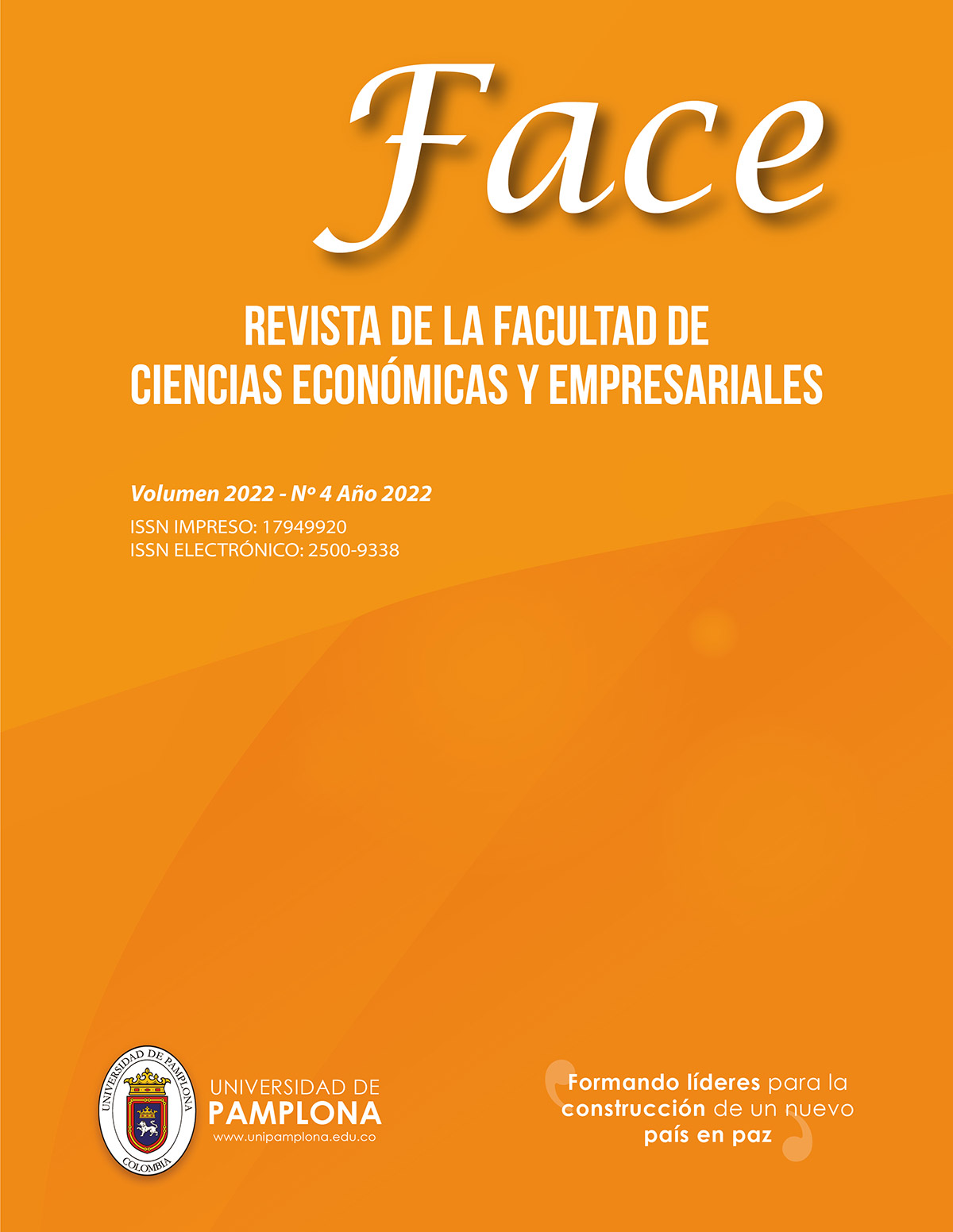Marketing sostenible basado en la lógica del dominio del servicio: una revisión sistemática de la literatura
DOI:
https://doi.org/10.24054/face.v22i4.2297Palabras clave:
Marketing sostenible, Cocreación de valor para el cliente, Lógica del DSResumen
Esta investigación pretendía descubrir cómo se ha desarrollado el concepto de marketing sostenible desde la perspectiva de la Lógica Dominante del Servicio (SDL) y la co-creación de valor en los ecosistemas económicos. Paralelamente, esta revisión pretendía analizar las principales premisas del SDL, como estrategia de intercambio basada en el servicio, la co-creación de valor en las empresas, y los actores del ecosistema económico, bajo un enfoque de sostenibilidad.
Para lograr estos objetivos, se planteó una revisión bibliográfica sistemática siguiendo la metodología PRISMA, basada en artículos publicados entre 2018 y 2022. De un conjunto inicial de 34 artículos extraídos de WoS y de la base de datos en el periodo analizado, se analizaron efectivamente 14. Los resultados revelan 4 temas centrales que representan los principales temas de investigación en los campos de Marketing, Turismo, Servicios de Salud, Innovación en Ecosistemas de Servicios, Mercados de la Base de la Pirámide y Comunidades Virtuales.
Las principales conclusiones sugieren que los siguientes temas de investigación parecen estar poco explorados. Este documento proporciona información a académicos, profesionales, responsables políticos, empresarios y otros actores del ecosistema económico para que se comprometan con la sostenibilidad. También puede ayudar a estos últimos a desarrollar estrategias para potenciar la cocreación de valor en las prácticas empresariales sostenibles, contribuyendo a ampliar los conocimientos en este campo de investigación.
Descargas
Citas
Abutaleb, S., & El-Bassiouny, N. (2020). Assessing sustainability marketing from macromarketing perspective: a multistakeholder approach. World Journal of Entrepreneurship, Management and Sustainable Development, 16(4), 287-305. https://doi.org/10.1108/WJEMSD-02-2019-0017
Diaz-Perdomo, Y., Alvarez-Gonzalez, LI. and Sanzo-Perez, MJ. (2021)A Way to Boost the Impact of Business on 2030 United Nations Sustainable Development Goals: Co-creation With Non-profits for Social Innovation. Front. Psychol. 12:719907. https://doi.org/10.3389/fpsyg.2021.719907
Font, X., English, R., Gkritzali, A., & Tian, W. (2021). Value co-creation in sustainable tourism: A service-dominant logic approach. Tourism Management, 82, 104200. https://doi.org/10.1016/J.TOURMAN.2020.104200
HsiungT-F, Cheng Y-H, Han Z-X (2021). Sustainable Partnership: Operational Condition Analysis for Brand Value Co-Creation. Sustainability.13(12):6516. https://doi.org/10.3390/su13126516
JieLiu, Wei Yang and Lei Cong (2022). The role of value co-creation in linking green purchase behavior and corporate social responsibility –An empirical analysis of the agri-food sector in China. Journal of Cleaner Production. Vol.360. No.1;132195. https://doi.org/10.1016/j.jclepro.2022.132195
Knizkov, S. and Arlinghaus J. (2019). Is Co-Creation Always Sustainable? Empirical Exploration of Co-Creation Patterns, Practices, and Outcomes in Bottom of the Pyramid Markets. Sustainability. 11(21), 1-22. https://doi.org/10.3390/su11216017
Kotler, P., Pfoertsch, W., & Sponholz, U. (2021). Rethinking Operative Marketing: The H2H Process. In H2H Marketing (pp. 157-216). Springer, Cham. https://doi.org/10.1007/978-3-030-59531-9_5
Kruger, C ., Caiado, RGG, Franca, S. and Quelhas, O. (2018) A holistic model integrating value co-creation methodologies towards the sustainable development. Journal of Cleaner Production. Vol. 191. No. 1. pp. 400-416. https://doi.org/10.1016/j.jclepro.2018.04.180
Martins, A.; Branco, M.C.; Melo, P.N.; Machado, C. (2022) Sustainability in Small and Medium-Sized Enterprises: A Systematic Literature Review and Future Research Agenda. Sustainability, 14, 6493. https://doi.org/10.3390/su14116493
Medvedeva, Y., Kolgan, M., Pasholikov, M., Shevyakov, Y., & Sidorenko, A. (2021). Priority goals for the strategic development of industrial enterprises based on sustainable marketing. In E3S Web of Conferences (Vol. 258, p. 06023). EDP Sciences. https://doi.org/10.1051/e3sconf/202125806023
Mihailova, D., Schubert, I., Burger, P., &; Fritz, M. M. C. (2022). Exploring modes of sustainable value co-creation in renewable energy communities. Journal of Cleaner Production. https://doi.org/10.1016/j.jclepro.2021.129917
Page MJ, McKenzie JE, Bossuyt PM, Boutron I, Hoffmann TC, Mulrow CD, et al. (2021). The PRISMA 2020 statement: an updated guideline for reporting Systematic reviews, 10(1), 1-11.https://doi.org/10.1136/bmj.n71
Peterson, M. (2021). Using macromarketing to teach business sustainability. Journal of Marketing Education, 02734753211048538. https://doi.org/10.1177/02734753211048538
Pogrebova, O. A., Konnikov, E. A., & Yuldasheva, O. U. (2017, May). Fuzzy model assessing the index of development ofsustainable marketing of the company. In 2017 XX IEEE International Conference on Soft Computing and Measurements (SCM) (pp. 694-696). IEEE. DOI:10.1109/SCM.2017.7970693
Rakic, B., & Rakic, M. (2018). THE CO-CREATING OF SUSTAINABILITY-ORIENTED VALUE IN SUPPLY CHAIN MANAGEMENT. Economic and Social Development: Book of Proceedings, 35-44.
Shapiro, S., Beninger, S., Domegan, C., Reppel, A., Stanton, J., & Watson, F. (2021). Macromarketing pedagogy: Empowering students to achieve a sustainable world. Journal of Macromarketing, 41(1), 104-115. https://doi.org/10.1177/0276146720949637
Sharma, P. (2021), "Customer co-creation, COVID-19 and sustainable service outcomes", Benchmarking: An International Journal, Vol. 28 No. 7, pp. 2232-2258. https://doi.org/10.1108/BIJ-10-2020-0541
Sheth, J. N., & Parvatiyar, A. (2021). Sustainable marketing: Market-driving, not market-driven. Journal of macromarketing, 41(1), 150-165. https://doi.org/10.1177/0276146720961836
Sirgy, M. J. (2021). Macromarketing metrics of consumer well-being: An update. Journal of Macromarketing, 41(1), 124-131. https://doi.org/10.1177/0276146720968096
Smit, B., & Melissen, F. (2018). Sustainable customer experience design: Co-creating experiences in events, tourism and hospitality. Routledge.
Vargo, S. L., & Lusch, R. F. (2017). Service-dominant logic 2025. International Journal of Research in Marketing, 34(1), 46-67. https://doi.org/10.1016/j.ijresmar.2016.11.001
Vargo, S. L., Lusch, R. F., Akaka, M. A., & He, Y. (2020). Service-dominant logic. The Routledge Handbook of Service Research Insights and Ideas, 3. https://www.routledgehandbooks.com/doi/10.4324/9781351245234-2#sec2_4_2
Wirtenberg, J., Russell, W., & Lipsky, D. (Eds.). (2017). The sustainable enterprise fieldbook: when it all comes together. Routledge.
Wooliscroft, B. (2021). Macromarketing and the systems imperative. Journal of macromarketing, 41(1), 116-123. https://doi.org/10.1177/0276146720980521
Wyllie, J., Carlson, J., Heinsch, M., Kay-Lambkin, F., & McCoy, A. (2022). eHealth Services and SDG3: Increasing the Capacity of Care. Australasian Marketing Journal, 30(2), 131–141. https://doi.org/10.1177/18393349211069114
Publicado
Cómo citar
Número
Sección
Licencia
Derechos de autor 2023 FACE: Revista de la Facultad de Ciencias Económicas y Empresariales

Esta obra está bajo una licencia internacional Creative Commons Atribución-NoComercial-CompartirIgual 4.0.





